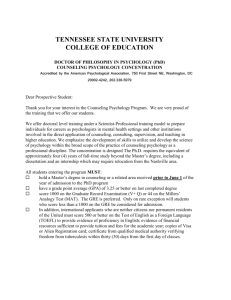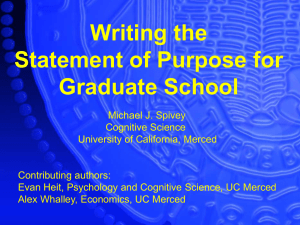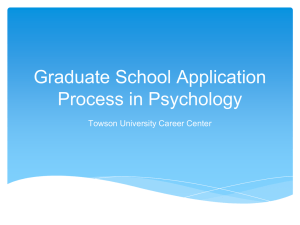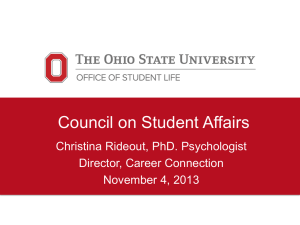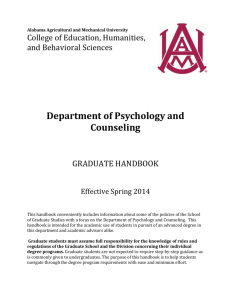Things to know before applying to graduate school in Psychology
advertisement
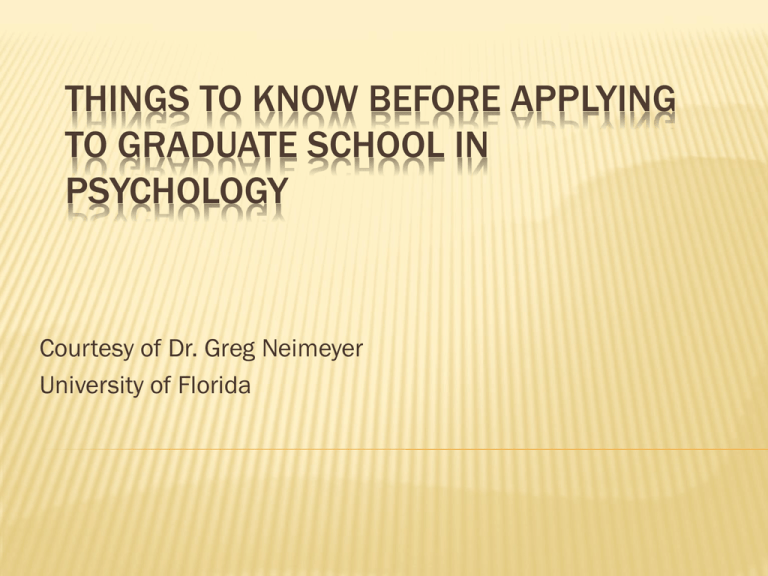
THINGS TO KNOW BEFORE APPLYING TO GRADUATE SCHOOL IN PSYCHOLOGY Courtesy of Dr. Greg Neimeyer University of Florida THINGS TO KNOW BEFORE YOU APPLY 1. Areas Within Psychology and Beyond 2. Level of Training: Masters vs. Doctorate 3. Ph.D. vs. Psy.D.: the Model Matters 4. Clinical vs. Counseling: Similarities--Differences 5. Reputational Rankings: All that glitters is not gold 6. Admissions criteria and acceptance rates 7. Attrition Rates 8. Grad School Funding #1 AREAS OF PSYCHOLOGY Percentage of Doctorates by area -44% clinical -11% counseling -6% educational psychology -6% I/O -5% school - 4% developmental - 3% social - 3% quantitative -1% cognitive -1% personality -12% other TWO CRITICAL POINTS APA-accreditation ONLY applies to doctoral training in professional areas Psychology is only one of several overall behavioral healthcare professions (Education, Marriage & Family Therapy, Psychiatric Nursing Psychiatry, Social Work) #2 LEVELS OF GRADUATE TRAINING: MASTERS OR PH.D.? Master’s degrees require 2 years Enables you to work in research contexts or clinical/counseling contexts Thesis or Non-Thesis tracks May or may not provide an advantage for subsequent doctoral work MASTERS OR PH.D.? WHY YOU MIGHT WANT TO DO A MASTER’S want to work at the master’s level (salaries may be comparable) not sure about commitment to doctoral study want to work for a couple of years first want to develop greater focus and interests before doctoral study applying to counseling psychology programs that require a master’s first MASTERS OR PH.D.? Why you might NEED to do a Master’s first 1. boost GPA 2. remediate course deficiencies (non-majors) 3. enhance clinical experience 4. enhance research experience 5. weak letters of recommendation (no mentors) #3 PSY.D. VS. PH.D. To understand the difference between these degrees requires knowing something about the history of training in professional psychology Boulder (Ph.D.) vs. Vail (Psy.D.) Model BOULDER MODEL (1949) established Ph.D. as the terminal research degree, as in other sciences clearly reinforced the idea that the university setting was the context for training established “scientist-practitioner” model VAIL MODEL (1973) psychological knowledge warrants professional training, as in medicine, dentistry and law offers Psy.D.s (designed to complement the Ph.D.) “Scholar/Professional” model (consumers of research rather than producers of research) housed in different contexts- university psychology departments, associated schools of psychology, or freestanding schools of psychology (e.g. CSPP) can be APA-approved is license-eligible #4. CLINICAL AND COUNSELING PSYCHOLOGY: SIMILARITIES Acceptance rates similar (about 8%) Average GPA identical 3.5 GREs: Very similar (just over 1200 on average) Similar salaries Same license Similar Training and Common Curriculum Similar Workplaces CLINICAL AND COUNSELING PSYCHOLOGY: DIFFERENCES Size -over 220 APA-approved clinical programs -approximately 75 APA-approved counseling programs clinical graduates about 2,000 doctorates/year; counseling graduates about 600 doctorates/year Both are vibrant, growing fields CLINICAL AND COUNSELING PSYCHOLOGY: DIFFERENCES Training Models (Ph.D. vs. Psy D.) Clinical has a much broader range of training models, ranging from almost exclusively clinical science programs through almost exclusively practitioner programs (Psy.D.) Clinical Science: over 40 programs are members of the Academy of Clinical Science -Regarding practice, virtually ALL Psy.D. programs are in clinical psychology, not in counseling psychology -Vail model programs tend to enroll many more students than Ph.D. programs Virtually all counseling psychology programs are “scientist-practitioner” programs CLINICAL AND COUNSELING PSYCHOLOGY Theoretical Differences Clinical is more oriented towards the medical model, diagnosis, disease, disorder, and dysfunction, and treatment, recovery, rehabilitation and psychopathology Counseling is more humanistic and pluralist, and oriented towards growth, development, adjustment, function and strengths CLINICAL VS. COUNSELING QUIZ Course in existential psychology? Course in career counseling? Course in life span development and adjustment? Course in neuropsychological assessment? Course in assessment of mental status/competence? Training in family systems theory and therapy? Training in psychopharmacology? Want a job in a VAMC? Want a job in a university counseling center? True or False: both clinical and counseling psychologists have the same license and both can be APA approved programs #5. REPUTATIONAL RANKINGS #1 factor applicants consider in making admission’s decisions where to access reputational rankings -APA journals and website: psychgrad.org variable criteria for ranking -straight reputation -# of faculty with ABEPP -faculty productivity -national offices/journal editors #6 ACCEPTANCE CRITERIA AND PERCENTAGES Overall acceptance rate: 10% for clinical and counseling, 20-60% for experimental areas Psy.D. accepts 1/3 to 1/2 of its applicants 10% is deceptive; between 1/3 and 1/2 off all grad applicants receive one or more offer of admission in a given year The Yield Rate (Offers/Acceptances) ACCEPTANCE CRITERIA AND PERCENTAGES GRE average = 1066 for M.S., 1206 for Ph.D. GPA average = 3.3 for M.S., 3.5 for Ph.D. all criteria show wide variability; overall profile and goodness-of-fit trump numbers More likely to increase chances of admission by tailoring your applications rather than applying to a large number of programs #7. ATTRITION RATES My graduate school experience On average, doctoral programs lose about 20% of their graduates Important to know because graduate education is an investment and attrition rates represent a risk Attrition can occur for at least three reasons- poor fit (avoidable), personal decisions (e.g. family), termination (impaired students) Obtain list of students in the program and contact at least two who have left the program #8 GRADUATE SCHOOL FUNDING Financing Graduate School: How to Get the Money You Need for Your Graduate School Education (Patricia McWade) M.S. programs only provide support for about 25% of their students Psy.D.s support about 35%-40% Ph.D.s support 90% + Funding can be fellowship, TA or RA with/without tuition waivers tuition waiver is important issue GRADUATE SCHOOL FUNDING Level of “real” funding needs to take into account -cost of living differences -”hidden costs” not covered by tuition waivers -availability of health insurance, education expenses for children, job opportunities for spouses, etc. Do not make decisions based on differences in graduate stipends SO, YOU’VE DECIDED TO APPLY? Successful Graduate Applications YOUR APPLICATION STARTS BEFORE YOU APPLY Email faculty with inquiries regarding -research -training -special interests The “A List” -Ask (about research, training, interests) -Acknowledge (acknowledge and thank) -Anticipate (express interest in contact) -Alert (about potential application) PERSONAL STATEMENTS, RESUMES AND LETTERS OF RECOMMENDATION The Seven Components of Graduate Application Volume of Graduate Applications and Review Procedure 7 COMPONENTS OF GRADUATE APPLICATIONS Application form GPA GREs Transcripts Personal Statement Letters of recommendation Vita VOLUME AND REVIEW OF GRADUATE APPLICATIONS 200 applicants x 15min = 3000 min / 60min= 50 hours of admission’s review per faculty This is only ONE of roughly 10 steps in the overall review process -wait for deadline for materials -review all folders -meet to discuss -review and identify top 30-40 -select and schedule interviews -conduct interviews (phone or on-site) -discuss -identify top 20-30 and rank order -submit for funding programs -notify you of acceptance or status OTHER TIME CONSTRAINTS Needs to happen within a 6-8 week window during which other duties still impinge-supervise doctoral advisees, theses and dissertations, conduct, develop, propose, defend, research, clinical supervision, edit and review books and journals, service at departmental, college, university and national levels, teach two or more courses, write and submit grants, and do admissions. Overall faculty work week = 56 hours RESULT Time dedicated to the review of your folder is likely to be 15 minutes or less TIME PER COMPONENT 1 to 2 rule: each component of your application will be reviewed for approximately 1-2 minutes OBJECTIVE VS. SUBJECTIVE COMPONENTS Application, GREs and Transcripts/GPA = “objective” components resume, personal statements and letters of recommendation = “subjective” components each provides some distinctive information and built-in redundancy OBJECTIVE COMPONENTS GPA: Overall, last 2 years, in the major GPA average = 3.3 for M.S., 3.5 for Ph.D GRE: Verbal and Quantitative GRE average = 1066 for M.S., 1206 for Ph.D. . SUBJECTIVE COMPONENTS: RESUME Purpose- to clearly display in synoptic form the information and experience that qualifies you for graduate study Use high quality, white, bond paper It will be reviewed for ~1-2 min, so limit to 2 pages + C.V. Likely to be consulted again prior to interview RESUME Name and Contact information Educational Background Clinical Experience Research Experience Presentations and Publications Honors and Awards References Course Listings RESUME Name and Contact information - top center - include email, phone, fax - boldface in slightly larger type (18+pt) RESUME Clinical Experience - what counts? Peer counseling crisis center volunteer work in nursing homes working in nursery habitat for humanity -list dates -if supervised, describe & list supervisor RESUME Research Experience: short narrative accounts of research experiences -class projects (e.g. in lab courses) -independent research -senior/honor’s thesis RESUME Publications and Presentations -papers completed (like senior thesis) -paper presentations -publications -list author(s), title, and presentation venue or publication outlet RESUME Awards and Honors scholarships recognitions or awards leadership positions Dean’s or President’s Honor role do NOT include High School Honors RESUME References -identify three or four people to contact -get prior approval from them to serve as references for you -provide complete contact information -use strategically to augment written letters of recommendation RESUME Course listings -provides opportunity to “package” yourself -do NOT rely on transcripts to do this for you -identify four or five clusters of courses such as foundation in psychology, research methods and statistics, clinical and personality, assessment, specialty courses, women’s issues, mental health, etc.- don’t forget to include any special topics or independent research courses- include grades, if good -paperclip as a single page onto the back of your vita -don’t worry about redundancy RESUME: WHAT NOT TO INCLUDE Hobbies, pets, favorite books or movies, workshops attended, numerous extracurricular duties/activities consider that your resume will be reviewed for only 1-2 minutes; during that short time, what do you want the reader to see most? PERSONAL STATEMENT Purpose: to present yourself effectively and to make the connection between your interests and the program to which you are applying -don’t depend on the reader to make this connection- do not stop with “I’m an excellent and interested person”- take the extra step: “why I would be a Personal good fit for your program” Statement PERSONAL STATEMENT Ordinarily only 1 to 2 pages, and no two are alike start with broad statement, usually with H.S. or college Then focus on specific experiences, events, and opportunities that have sharpened your focus and interests PERSONAL STATEMENTS Use “upbeat words” and expressions -e.g., “excellent”, “terrific opportunity”, “very pleased to have been chosen”, “gratified to have been selected for…”, “surprised at how excited and interested I was in…” PERSONAL STATEMENT Identify current research interests and two or three faculty you might like to work with -natural if you have already emailed faculty -do not list everyone -check to make sure they are “core” faculty PERSONAL STATEMENTS: STYLE Enthusiasm Humility Focus and dedication PERSONAL STATEMENT: STYLE Do not stretch, modify, or enhance anything, including your level of interest in research if that is not true- recipe for disappointmentDo not try to sound “smart” or prove yourselfjust be yourself Attribute flattering things about yourself to sources other than yourself, e.g., “A number of my faculty have noted the level of dedication and initiative that I have taken in my work, and I have been gratified to have been chosen to serve as the head of the research team.” PERSONAL STATEMENT Read the statement out loud. Time it. Give it to friends to read (does it sound like you?) Give it to a faculty member to read and provide feedback on Ask him/her what overall impression it leaves? “On a scale of 1 to 10, how would he/she view this statement?”- How could you improve it? LETTERS OF RECOMMENDATION Purpose: to secure outside evaluations of you from sources that most closely approximate the faculty with which you will be working. Includes professional, personal, and interpersonal commentaries. Research demonstrates that letters of recommendation are the single most important source of “subjective” information in your Letters of application Recommendation CHOOSING LETTER WRITERS Knowing this, choose carefully First, how many: 3-4 Second, who: academic, clinical, research All Ph.D. or co-signed by Ph.D. No politicians, family friends, practicing therapists, etc. LETTERS OF RECOMMENDATION Choose people who know you well, who can speak to different aspects of your experience, and who can and will take the time to write a strong letter ask, “Would you be willing to write me a strong letter of recommendation for graduate study in psychology?” PROVIDE LETTER WRITERS WITH: Department Questionnaire Thumbnail sketch that includes -name and contact info -how they know you -your GRE and GPAs - bulleted items that you want them to include e.g. Psi Chi president, APA convention, focused area(s) of study, honors or awards -redundancy is fine PROVIDE LETTER WRITERS WITH: Prominent deadline for completion, one week earlier than earliest deadline Provide a complete list of ALL schools and addresses at one time, if possible be sure to identify the type of program, (counseling, clinical, developmental, cognitive social, etc.), and call attention to any differences in this regard- stating the wrong program can be “kiss of death”- OTHER POSSIBLE INCLUSIONS Published papers (seeing is believing) FINAL WORDS Now your materials are off and you can prepare for your interviews. Not a time to be passiveemail any faculty you have had contact with and indicate that you have appreciated the contact that you have had with them and, based on that experience, you have decided to apply to their program. FINAL WORDS In addition, email two or more grad students from the program to get their take on the program “what has your experience been like so far?” “In what way has the program met your expectations and in what ways is it different”, etc. FINAL WORDS The entire purpose of applying is to get an interview. Period. You are more likely to get an interview if your file is viewed as a person, rather than as another “unknown applicant”. So advance contact by phone or email is one of the biggest things you can do to advance your graduate application.
